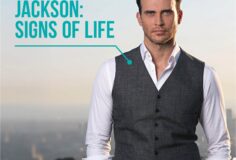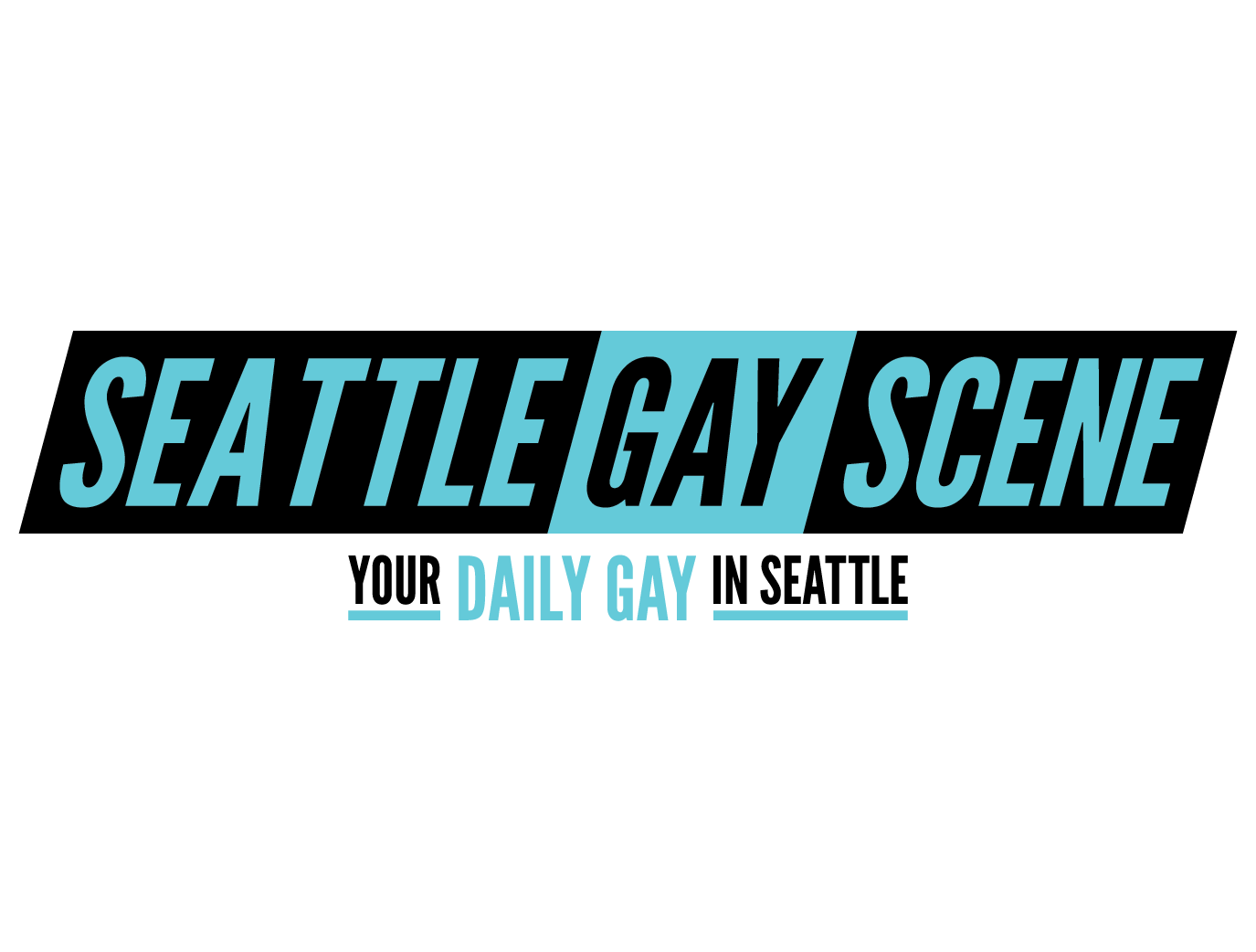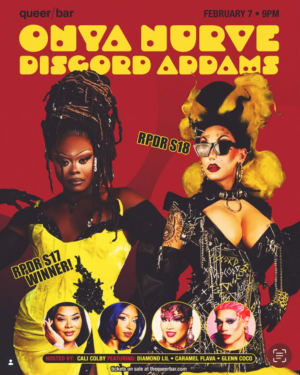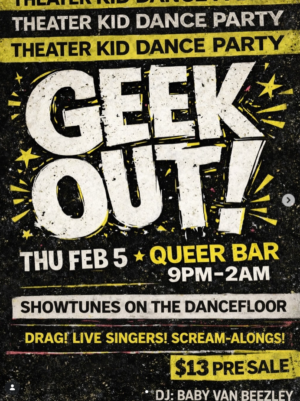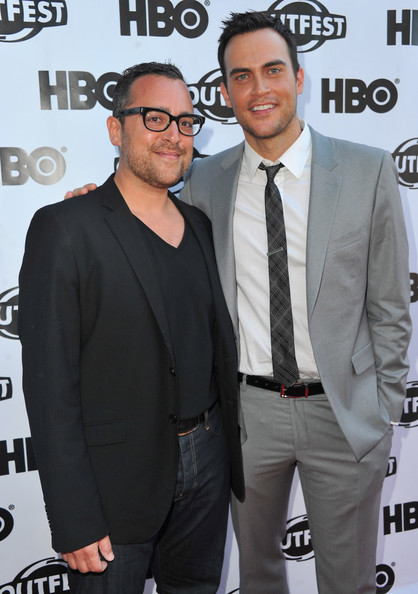
Writer/Producer Paul Marcarelli and co-star Cheyenne Jackson at Outfest for their film, "The Green".
In the film, “The Green” which screens Friday night at 7:45pm at the Admiral in West Seattle as part of the 16th Seattle Lesbian & Gay Film Festival, a dreadful accusation tears a verdant Connecticut town apart. Michael, a teacher played by Jason Butler Harner and his partner Daniel (Cheyenne Jackson) move from NYC to an idyllic suburban community where Michael befriends a questioning male student in his school. Problems develop when the student claims he engaged in “inappropriate behavior” with Michael, an accusation that results with serious repercussions for all involved. The film, which co-stars Julia Ormond and Illeana Douglas was directed by Steven Williford and written and co-produced by Paul Marcarelli, a name not nationally known, but the face behind that name is very well known if not a bit iconic…Mr. Marcarelli responded to our emailed questions to him, as he prepared for the film’s opening in New York after a successful series of screenings on the film festival circuit.
Michael Strangeways: The production team behind “The Green” has made it known they were very much committed to hiring as many out LGBTQ actors as possible for the LGBTQ roles in the film. Why was this important to you, and the team?
Paul Marcarelli: I think there’s a unique relationship an audience has with a gay couple on screen when they are not constantly drawn out of the story by the breathless marketing that surrounds the “tremendous risk” Straight-Movie-Star-A took by kissing another dude on screen. Aren’t we getting a little tired of seeing straight people telling our stories for us all the time? In the absence of anything else crossing into the mainstream, it starts to undermine the credibility of an entire body of story-telling.
MS: “The Green” has earned a lot of love on the LGBT Film Festival circuit; you won awards in Atlanta and San Diego. Obviously this story resonates with queer audiences…the subject matter, an attractive cast with out actors in key roles, the strong production values and the emotional heart of the story. Can an overtly gay themed film, connect with non gay audiences?
PM: Yes. In addition to our inclusion in dozens of LGBTQ festivals worldwide, we have played to at least as many broader audiences. We were really proud of the fact that early on in the festival run, we were honored with the Best Feature Film Award at the Connecticut Film Festival, as well as the Audience Award for Best Feature at OutfilmCT, two audiences that most closely reflect both the characters we depict in the film and the types of audiences we hoped to reach without having to pander to either one. We have gone on to play to straight audiences in places like Texas, Maine, Rhode Island, and Colorado to name a few to overwhelmingly positive response. Our distributor FilmBuff was attracted to this film because of its broad thematic reach.
MS: You’re from the New York theater world…were you already connected to your two lead actors, Cheyenne Jackson and Jason Butler Harner, who also have substantial theater credits?
PM: I have been an huge fan of both these amazing actors for years, and I feel so incredibly grateful that they helped us tell this story. We knew that to do something different here — and to accomplish it on such a swift schedule — we would have to have a uniquely talented cast. The fact that you believe these guys have been together for more than a decade, even though we had no rehearsal and Jason and Cheyenne only got together to discuss the script the night before we began shooting, is a testament to their greatness. We were so worried the relationship would read as brand new, but both actors had this subtle and nuanced understanding of the given circumstances and were able to harness that to portray a couple that have weathered many years together.
MORE after the Jump.
MS: More and more young actors are publicly out now, even actors that aspire to do mainstream film and television…is this a hopeful sign that the ridiculous Hollywood Closet door is starting to break down?
PM: I’m going to go out on a limb here and say that we will have made real progress on this front when we begin to see openly gay actors portraying gay characters on screen in films that are intended for broader audiences. It’s a real conundrum. Because the industry won’t give audiences enough credit to buy an openly gay actor playing straight on film, gay actors have a harder time building a body of work that will give them the clout to open or carry a film. So we continue to see straight actors playing us on screen because the big name is what draws in the audience. Then of course you get into the decisions that the few successful openly gay actors have to make in order not to become typecast. It’s all enough to make your head spin.
MS: The subject matter of the film is very timely…was there a specific real incident that led you to writing the script? The teacher accused of sexual misconduct with a student is a regular fixture in the headlines of local news across the country.
PM: It’s one of those things — along with shootings and house fires — that virtually guarantees ratings. But you rarely hear anything about these cases past a single news cycle. The presumption of guilt is a given and the viewer’s understandable indignation is what news programmers count on in order to draw them in. Add in that the teacher is gay and I think the reaction is compounded. An accusation of child abuse is an awfully difficult bell to un-ring. We wanted to tell the story behind this type of headline.
MS: It’s set in Connecticut, your home state…how deliberate of a choice was that? Are there auto-biographical elements to this story?
PM: If there are autobiographical elements they exist only in some of the themes in the film. The fact that the film takes place in one of the few states where gay marriage is legal gave us the opportunity to engage a more nuanced dialogue about the relationships between gay people and their straight neighbors. From the outset we wanted our story to test that subtle membrane that suppresses the deeply seeded bias and homophobia simmering just beneath the surface in an otherwise tolerant and harmonious community.
MS: As an actor, is it tough to switch hats and be the writer and the producer….the Boss of the production, the guy who has to say “No” sometimes?
PM: Not really. When you are the producer, and one of the people ultimately responsible for the success or failure of the project as a whole, you are less inclined to focus myopically on any one department. When you’re just the writer, your focus is all script… and every word counts. When you’re just the person standing under the light, all your focus tends to be on what’s happening in that little glowing circle. Being a producer, in fact, has made me a better writer in some respects.
MS: Were you tempted to cast yourself in a major role in this film?
PM: No. I never even considered it. From the outset we sought out the actors that would best help us tell this story. And I think we nailed it.
MS: We have to acknowledge the “elephant in the room”…of course, you were the iconic “Verizon Man” famous for “Can you hear me now?” for nearly a decade. You wrapped up your Verizon gig earlier this year and publicly came out just before your contract ended, though you were privately out to family, friends and co-workers for many years. I have a couple questions: was the response largely positive, or not? And, over the years, did “Verizon Guy” get fan letters? Did swoony teenagers, lonely old ladies, and horny prison inmates reveal their inner most thoughts and desires to you? Or, did they all just want discounted cell phone service?
PM: First I have to point out that despite what you may have read, I am still very much under contract to Verizon. In fact my character, Test Man, just made an appearance in the opening number of the Emmy’s with Jane Lynch. (She is AWESOME by the way, in every sense of the word.) I recount in great detail the media juggernaut that lead to this misperception in a column that comes out the week of October 17th on a prominent blog, but in the interest of brevity I will just say that I have never had any public persona apart from the face recognition that comes with my commercial work, so even though I have been out since I was a teenager, it has never been written about. It was only in the interest of discussing my work as a filmmaker that I agreed to an interview in the first place. In addition I will say that it is inherently political to create any gay-themed work, and I thought it was important that I be forthright about the perspective from which I wrote this script. And for the record, I have received mail from all of the above…
MS: According to IMDB, you are writing and producing a comedy called “Clutter” about “a family who must de-clutter or lose their home.” True? False? Do you have a start date for filming? Was this inspired by a marathon of watching “Hoarders”?
PM: Yes, we begin shooting Clutter in March. We are nearly funded and are just beginning to talk with actors. I’m so excited about this project I can barely sleep at night. I LOVE the hoarding shows, but I have to say the real inspiration came from the junk drawer in my kitchen in Connecticut. Everyone has a secret, shameful pile in some corner of their lives. There aren’t any gay characters in this one, a fact which has met with a number of raised eyebrows on the gay festival circuit this summer. I just think that if our work is to remain relevant, it’s just as important for gay filmmakers to create stories that reflect our sensibilities, as it is to create stories that reflect our experiences. I for one, do not like to be pandered to as a part of some perceived niche audience. Just because I’m gay doesn’t mean I only want to see gay characters on screen. Like most audiences, I want to see great stories. I’m encouraged by conversations I’ve had with gay festival programmers I’ve met this summer, who want to foster the work of gay filmmakers even if the characters in their films aren’t gay. I have always thought that a film is gay if a gay person makes it.
MS: What are your long term goals? More writing/producing? Do you see yourself doing more acting again?
PM: Didn’t you hear? I’m buying LA. So basically I’m going to be in charge of everything.
Yes, we can hear you now! (Sorry, couldn’t resist; he left that wide open.)
Thank you , Paul Marcarelli and check out “The Green” at the Seattle Lesbian & Gay Film Festival.


